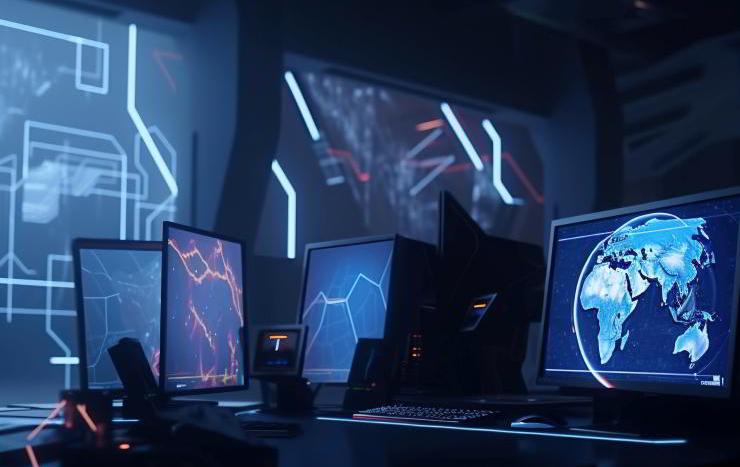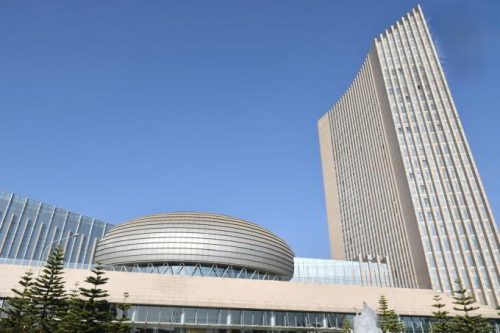Intelligence. The Digital Challenge.

The market is expected to reach $700 billion by 2050. However, cybersecurity is a growing concern, with increased attacks and significant losses in countries such as South Africa and Nigeria. Often, regimes use technologies to survey dissent.
It was in January 2018 that an investigation by the French newspaper Le Monde revealed espionage activities conducted by China in the headquarters of the African Union in Addis Ababa, in the buildings
built by the Chinese state company China State Construction
Engineering Corporation.

Addis Ababa. African Union Headquarters. From 2012 to 2017, the data contained in the computers used by the organisation’s employees was transferred to Chinese servers in Shanghai. UN Photo/Antonio Fiorente
For five years, from 2012 to 2017, the data contained in the computers used by the organization’s employees were transferred to Chinese servers in Shanghai. While sensitive information escaped at night, during the day an army of bugs captured voices in the rooms and along the corridors. Shortly after, a cell of Mustang Panda, a group of hackers in the pay of Beijing, stole the footage from the security cameras: “If you let them build the entire system, it’s obvious that they’ll listen to you,” a Western diplomat commented on the news while it was still hot. In Africa, most of the telecommunication infrastructure was set up, in fact, by two Chinese giants, Huawei and ZTE.
The US hunting down data centres
A cumbersome presence, to say the least, that the United States is now trying to counter by grabbing the properties of African data centres. Equinix and Digital Realty have won the biggest fish. The only player on the continent capable of holding their own is Africa Data Centre, a subsidiary of Cassava Technologies based in South Africa.

In 2023, there were 23% more cyberattacks in Africa than in 2022. Losses were estimated at 10 billion dollars. 123rf
With the Cloud market constantly growing and the rise of Artificial Intelligence applications, the real security challenge at a global level will increasingly depend on the control of data archives and processors. This also applies to Africa, where the digital market will reach a turnover of over 700 billion dollars in 2050 and where in 2023 there were 23% more cyber-attacks than in 2022, with losses estimated by the Kenyan company, Serianu, at 10 billion dollars.
Regulatory antibodies
For years, the African Union has been equipping itself with regulatory antibodies to deal with these scenarios. In 2014, the Malabo Convention was signed, a community document aimed at increasing cybersecurity and the protection of personal data on the continent, ratified in 2022 with the Lomé Declaration by Togo and the Economic Commission for Africa (UNECA). In January 2024, the Peace and Security Council of the African Union (PSC) unanimously adopted the Common African Position on the Application of International Law on the Use of Information and Communication Technologies in Cyberspace, adhering in many points to the protocols launched by the European Union.

According to the 2024 Global Cybersecurity Index, , the top-performing models are those developed by Mauritius, Ghana, Kenya, Rwanda, and Tanzania.
However, not all African states are moving at the same speed and in the same direction. According to an analysis by the Africa Centre for Strategic Studies in 2022, only three countries have prepared a structured threat assessment plan, with adequate investments: Eswatini, Kenya and Senegal. According to the 2024 Global Cybersecurity Index, drawn up by the International Telecommunication Union, the best-performing models are those developed by Mauritius, Ghana, Kenya, Rwanda and Tanzania. Matteo Lucchetti is the director of Cyber 4.0, an organization that provides support to law enforcement, magistrates and prosecutors in the fight against cybercrime. For the Council of Europe, he coordinated a project to support several African states, working closely in particular with the National Cyber Security Authority of Ghana. “In the sector, Accra represents a hub for the English-speaking countries of West Africa, while Senegal is for the French-speaking ones and Cape Verde for those in the area of Russian influence”, he explains. “Ghana has ratified the Budapest Convention of the Council of Europe, adopted by Western countries but opposed by the BRICS bloc. By receiving know-how and devices from Europe and the United States, this country has greatly strengthened in terms of organization, technological protections, reaction capacity and data protection”.
Instruments of repression
While investments in cyber threat intelligence have allowed Ghana and other African countries to improve their performance in gathering and analysing information and predicting threats, a circle of regimes on the continent have instead armed themselves with innovative cyber espionage techniques and tools to repress dissent.

Seven African governments had purchased Pegasus spyware. 123rf
In 2021, four executives of the French companies Amesys and Nexa ended up under investigation for allegedly providing the regimes of Egypt and Libya with cyber-surveillance tools to monitor opponents. In 2020, a Citizen Lab dossier from the University of Toronto’s Munk School of Global Affairs combed through the customers of Circles, a company linked to the Tel Aviv-based tech firm NSO Group, and found that seven African governments had purchased its Pegasus spyware, software capable of identifying a person’s location with just their phone number, hacking the SS7 (Signalling System #7) system, capturing everything contained in the cameras and microphones built into cell phones, tracking app usage, and following web and social media browsing patterns. The list included Nigeria, Botswana, Kenya, Equatorial Guinea, Morocco, Zambia, and Zimbabwe.
Propaganda on the Web
Even on the web, many African states find themselves in the limbo of external spheres of influence. Some are hit by propaganda campaigns, or become their megaphone. The case study of recent years is the activity to discredit the West carried out through TV, radio, newspapers and especially local sites and social networks by former Wagners, in the countries where the military company that went under the name of Africa Corps operates. “When protests against a government erupt, typically those in power turn off the Internet so that opponents cannot communicate with each other,” concludes Lucchetti. “But countering propaganda with more propaganda, in addition to going against the principles of respect for freedom of expression and access to information, is not a lasting solution and also leads to a loss of productivity. Protecting governance from phenomena like these is difficult especially in countries that are fragile on a democratic level. It happened recently with Niger. And now there are fears for Chad.”

About 90% of private African companies operate without cybersecurity protocols. 123rf
Between the cyber militarization manoeuvres imposed by the Kremlin, Chinese investments in infrastructure and cyber governance programs proposed by Western partners, the challenge for African countries is to carve out and defend spaces of autonomy also in the digital dimension. This applies to governments and also to businesses. According to an estimate reported by African Business, about 90% of private African companies operate without cybersecurity protocols, which makes them vulnerable to hacking, phishing and malware attacks. Holes that end up costing South Africa 570 million dollars and Nigeria 500 million dollars every year. (Open Photo: 123rf)
Rocco Bellantone



